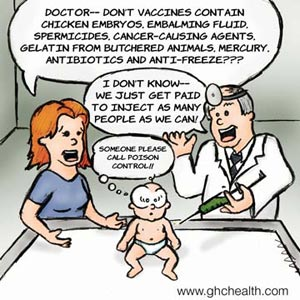If you have watched the news within a recent number of years then you have probably heard about the epidemic of autism at some point. Autism is a mental condition that appears in early childhood where children have trouble communicating and forming relationships with people. Within the last 20 years there has been an increase in the number of children diagnosed with autism. Some have claimed that this increase is directly related to vaccines containing the preservative thimerosal, given to children at a young age. However, there is no autism-vaccine link, and this is a large misconception by the public.
The media has mainly popularized this myth. NBC’s Meet the Press had an entire show dedicated to the “autism epidemic” and assertions that vaccines containing thimerosal cause the epidemic. This claim has also been expressed in the media through presidential candidates in the 2008 race, best-selling authors, famous athletes, and the cartoon below.
There is just flat out no evidence for any link between autism and vaccinations containing thimerosal. Studies worldwide have shown that even if the rates of vaccinations stayed the same or went down, the rates of diagnosed autism still increased. A study in The Journal of American Medical Association found that vaccines either containing thimerosal or thimerosal-free
vaccines given to children did not lead to differences in the number of autism diagnoses (Anders et al., 2003).
There are also reasons to doubt that autism is becoming more common.
In 2001 autism was said to have affected about 1 in 2,500 and in 2007 about 1 in 150 (Lilienfeld et al., 2010). Let us look at why these numbers have turned out like this.
One of the main contributors to these rising rates is the diagnosis of autism itself. In 1980 6 out of 6 criteria had to be met in order for an individual to be diagnosed with autism. In 1994, 8 of 16 had to be met (Lilienfeld et al., 2010). The criteria for the diagnosis for autism have become considerably easier to meet.
There is an even bigger problem at stake, the danger of this misconception. Without these vaccinations children can develop very serious diseases. At the time children receive these certain vaccinations such as the measles, mumps, and rubella (MMR), it is only a coincidence that they develop autism (Mayo Clinic 2013). There are cases around the world where increases in measles have been seen in areas refusing to use vaccinations.
So take note on this widely misconceived myth. As you begin to have kids or already do, know that no vaccine is out there that could harm them. Receiving these vaccines are vital to children’s health and without getting vaccinated your child is at greater risk for developing diseases and even death.
Here is a short video explaining the myth in a very viewer-friendly way.

